Mississippi Today
Mississippi University for Women is betting its future on a new name. Will it work?
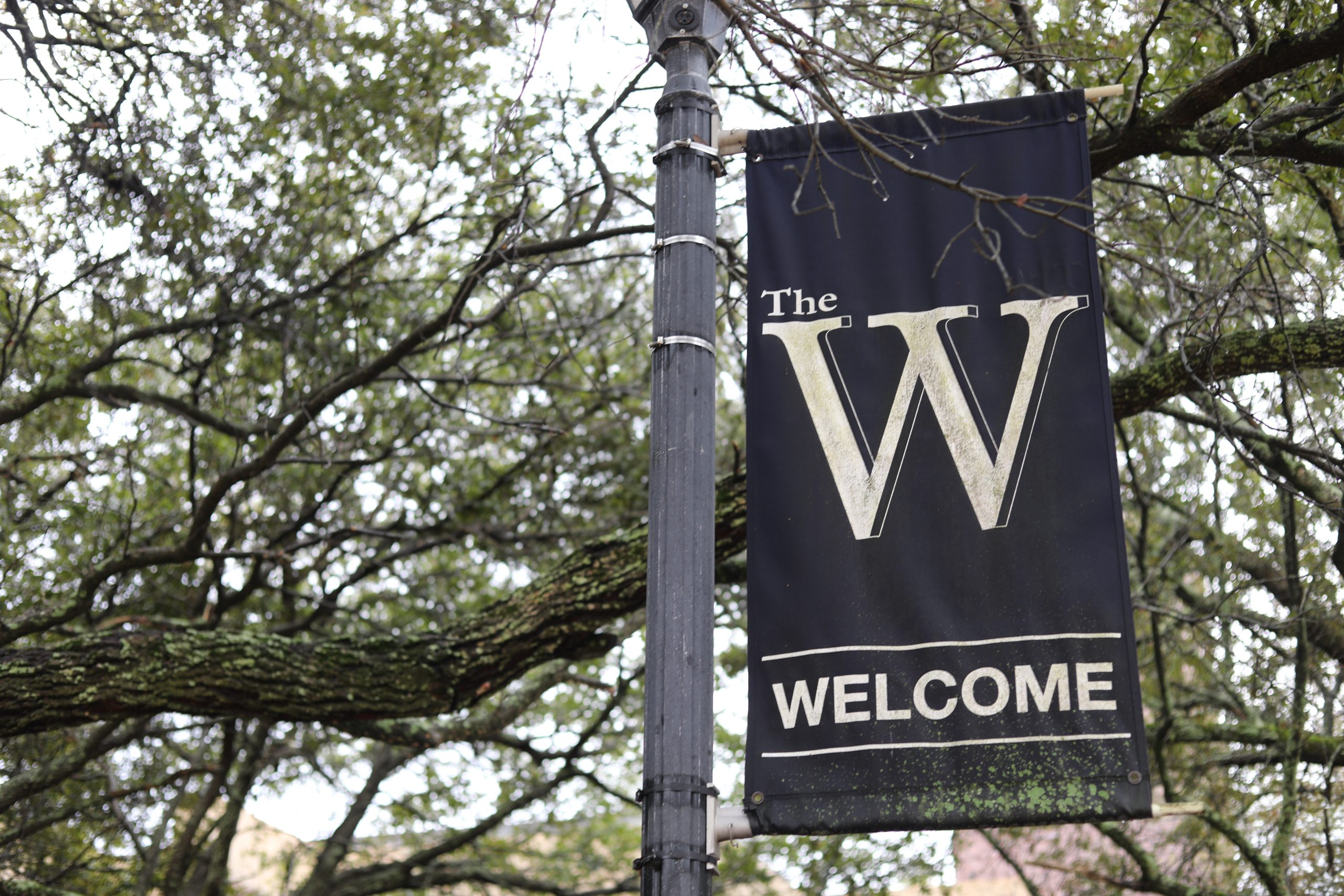
COLUMBUS — Nora Miller, the president of Mississippi University for Women, opened a letter from her deans in 2022 that warned the country’s first state-supported women’s college had reached a critical crossroads.
Without bold change, the deans wrote, the pool of prospective students was “likely to grow dangerously thin,” affecting tuition. Their recommendation: Change the name to one that includes all students, not just women. After all, the university had been co-ed since 1982.
One consulting firm, three listening sessions, 4,300 survey responses, one failed proposal, and one apology later, MUW will ask lawmakers to approve a new name next month. But as the institution seeks to reposition itself to meet an uncertain moment for higher education in Mississippi, it has faced criticism from some alumni, passionate about the past, who have questioned if a new name is needed at all.
Lost in the hullabaloo is the fact MUW faces much bigger issues than its name, according to more than a dozen interviews Mississippi Today conducted with students, faculty, administrators and alumni.
Enrollment has continued to fall since the dean’s letter. All told, the campus has shrunk to just 2,227 students from its peak of more than 3,100 in the late 1990s. The tuition-dependent university has been operating at a deficit, losing $18 million in fiscal year 2022. And it likely can’t turn to the state for help: Mississippi’s state funding for higher education has barely recovered from the Great Recession of 2008. The liberal arts education that MUW offers is increasingly pooh-poohed by lawmakers and other state officials who view workforce development as “the message of the day.”
To be sure, all of Mississippi’s regional colleges are struggling, so MUW’s plight isn’t totally unique. But within thirty miles of its doorstep, MUW is facing a hydra — a behemoth SEC school, a booming industrial park and a flourishing community college — all while dealing with a name that excludes roughly half of the students it wants to admit.
“It’s kind of like false advertising, isn’t it?” said Dee Anne Larson, a marketing professor on the university’s naming committee.
The university has acknowledged it needs to do a better job of selling what it offers: Comparatively affordable tuition, small class sizes and a familial campus. It has revamped its recruitment strategies, brought back athletics and pumped money into professional programs like culinary arts, speech language pathology and nursing.
“While we would prefer not running at a deficit,” Miller said, “sometimes you have to invest in things.”
Signs of that investment, though, are hard to spot. North on Highway 25, a brick sign for Starkville brags of being the “home of Mississippi State University.” Over the Lowndes County line, at the Golden Triangle Global Industrial Aerospace Park, is East Mississippi Community College’s glassy “communiversity” and its LED marquee.
The sign for Columbus, called the “friendly city,” makes no mention of MUW. The university employs hundreds of people in the region, a fact belied by its quiet presence.
Miller acknowledged workforce development programs entice high school graduates. But, she said, when younger workers from Steel Dynamics get tired, they’ll start looking for a pathway to office jobs.
“And I think some of those steelworkers aren’t gonna take advantage of that” at MUW, Miller said, “because ‘Mississippi University for Women’ will be on their degree.”
Cutting ties with the long blue line?
When MUW sent Miller an offer letter in 1979, she thought it was for a “finishing school” and threw it in the trash. Her mom convinced Miller, a National Merit Scholarship semifinalist, to take a second look.
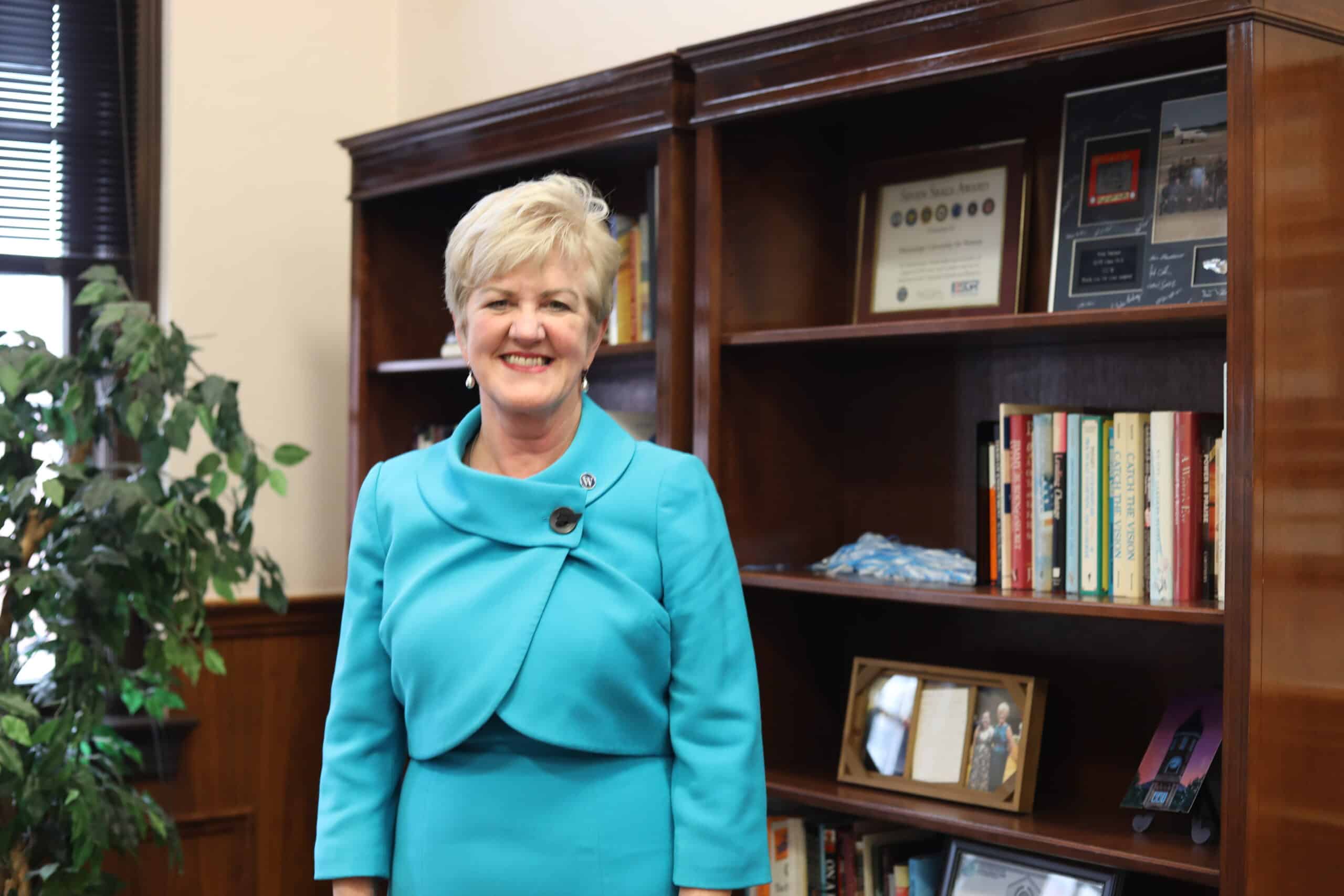
Three years later, when the Institutions of Higher Learning Board of Trustees ordered MUW to admit men following a U.S. Supreme Court ruling on the university’s admissions policy, Miller’s first thought was “at least we get to keep the name.”
Then state-supported women’s colleges across the country started taking “women” out of their names. MUW didn’t in large part because the university’s leadership failed to get alumni on board. Even though the university has changed its name four times throughout its history — it was originally the Industrial Institute and College for the Education of White Girls — the alumni just couldn’t let go of “The W.”
Many still can’t.
Earlier this month, the university’s first proposal, Mississippi Brightwell University, flopped. The feedback was resoundingly negative.
That’s when an unofficial group of alumni started discussing an alternate proposal: “The W: A Mississippi University.” It seemed to capture the campus’s Ivy League aspirations, said Laura Tubb Prestwick, who graduated in 2008, works in brand-name strategy and was part of the unofficial group.
There’s an emotional stake in changing the name for “W girls” like Prestwick, whose grandmother also attended. Prestwick grew up going to modeling, photography and musical theater camps at MUW, and reading old copies of the “Meh Lady” yearbooks.
“When Tropicana changed their packaging, they saw a 20% drop in sales,” Prestwick said. “That’s an emotional tie to orange juice. Can you fathom it being somewhere you took out student loans for?”
Facing the demographic cliff
But MUW can’t sustain itself solely off the pockets of legacy students like Prestwick.
In Mississippi, as in nearly every state in the country, the number of high school graduates is poised to decline, an ominous trend deemed the “enrollment cliff.” This will force increased competition among Mississippi’s eight public universities, all of which are already more dependent on tuition than state funding, and 15 community colleges.
The future winners of that fight are laying the groundwork today. And MUW is already on the backfoot.
More than 200 freshmen used to enroll in MUW each year, according to the university. But since 2009, when EMCC’s Golden Triangle campus started a tuition-guarantee program, MUW is lucky if the freshman class broaches 200 at all. In the last decade, MUW has lost 600 undergrads — while down the road, Mississippi State University has seen undergraduate enrollment nearly triple that same amount. Meanwhile, last fall EMCC saw its largest enrollment increase in more than a decade.
The bleeding shows no signs of stopping. But MUW has been retooling its approach. In fall 2022, Miller promoted the longtime head of student success, David Brooking, to executive director of enrollment management.
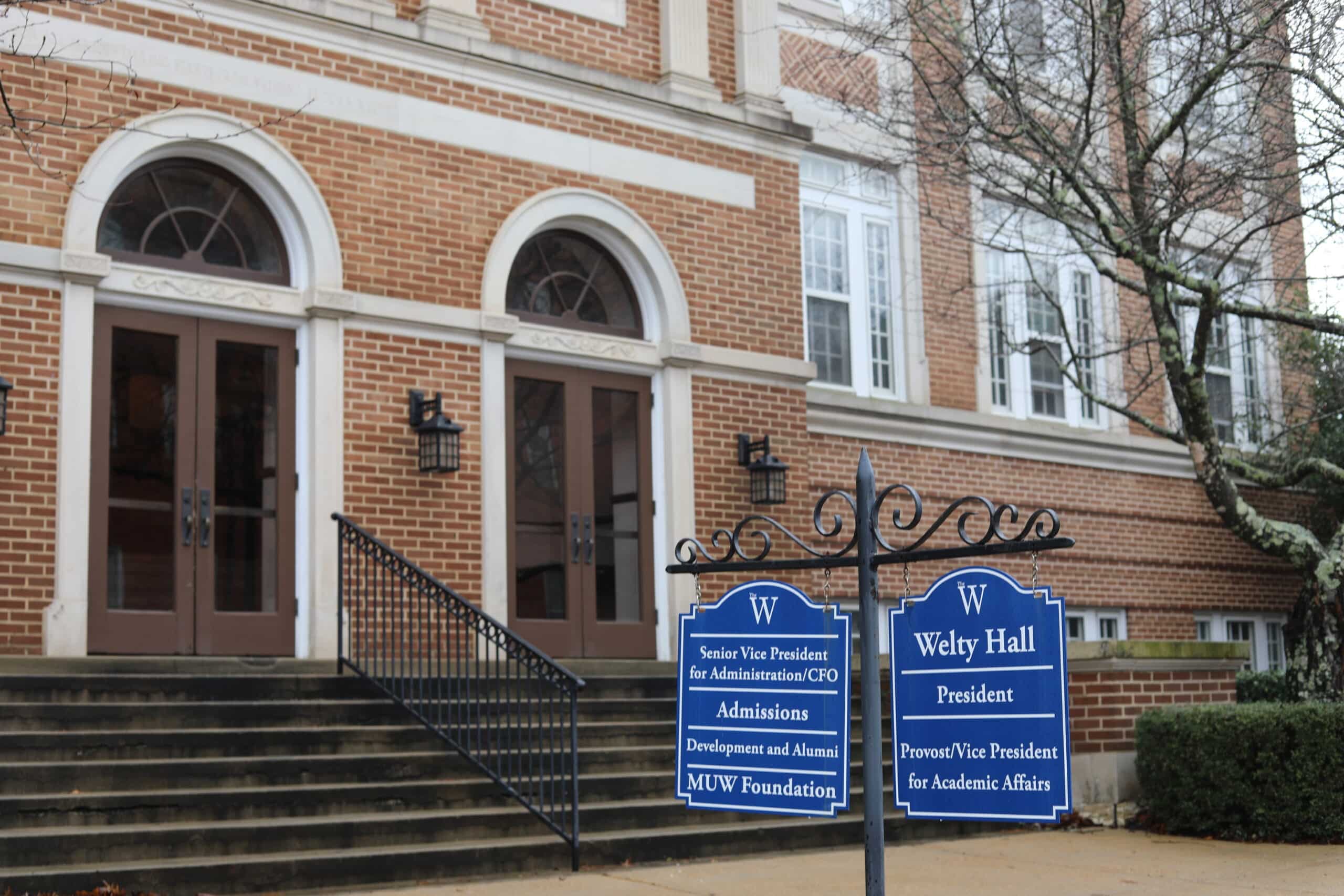
One of the first things Brooking noticed was that MUW needed to do more outreach. The university was buying mailing lists to send letters like the kind Miller got in high school, but not nearly enough names — just 10,000 students when it needed more like 50,000. Brooking fixed that and has expanded MUW’s digital advertising, which he says is the way to reach the introverted, studious high schoolers who’d thrive at MUW.
Showing up at college fairs in parts of Mississippi with a growing population has been a challenge. The recruiting position assigned to the Coast, nearly five hours from Columbus, had been open since September, but only one person applied. Brooking plans to repost it as a remote job.
Even when MUW is present, the name impedes the elevator pitch.
“You only get two or three minutes to talk to a student at a college fair, if they’re even showing interest,” Brooking said. “We have to tell them what we’re not before we can tell them what we are.”
Brooking’s new approach isn’t expected to bear fruit until this fall, Miller said. In the meantime, students can tell the campus is emptier. Laila Wrenn, a member of the student government and a resident assistant, has noticed there are fewer freshmen in the dorms.
A junior on the pre-med track, Wrenn came to MUW for its close-knit campus, but she gets why others don’t.
“It’s just not fitting what they wanted college to be, kind of how they portray college on TV,” she said. “When you’re at the W, it doesn’t fit that picture. It’s not a party school. People commute here. It’s really quiet and it’s down to earth, and I feel like a lot of people aren’t attracted to that.”
MUW does have one powerful tool on its side — cost. At $7,766, it has the second lowest tuition for a public university in Mississippi. (In contrast, a year of tuition at Mississippi State runs $9,400.)
“If you’re gonna quote me on anything about that college,” said Ryan Ahrens, who graduated from MUW in 2021 with a business degree, “it is for sure and without a doubt the bargain of the century.”
Competing for men — literally
Ahrens, a Lowndes County native and transfer from East Mississippi Community College, was the exact kind of student MUW has been desperate to attract. And yet, he ended up there by accident.
“I missed the admissions window for State, and then I said at least the W is still open,” he said.
The university’s name is one reason it has struggled more than other former women-only colleges to attract men, according to a 2009 study commissioned when a past president, Claudia Limbert, sought to change the name. Since 1990, MUW has barely moved the needle on the number of men it admits, from 442 to 532 in 2020.
For his part, Ahrens thought the two-year renaming process moved too quickly. But alumni don’t control the school, he said.
“It’s not our job to have a hand in the pot, it’s our job to make the pot full,” he said. “In order for you to be proud of the university that you graduated from, it still has to be there decades after you leave it.”
But the name is far from the only area of improvement Ahrens sees. He listed several things that, as a conservative, white member of a fraternity, he saw could be improved: The dorms, the outreach and a vibe he described as “a stern ‘what are you doing here’ kind of look.”
“If you’re a man going through the W, you gotta go in with a strong mind and a thick skin cause people are gonna talk crap, like ‘you’re just another W girl,’’ Ahrens said. “Like no man, I’m a man.”
And then there are sports. Changing the name, Ahrens said, is the hardest thing an MUW president has attempted to do since getting into the NCAA last year. Bringing back sports, which the university disbanded in 2003, is part of an effort to attract more students.
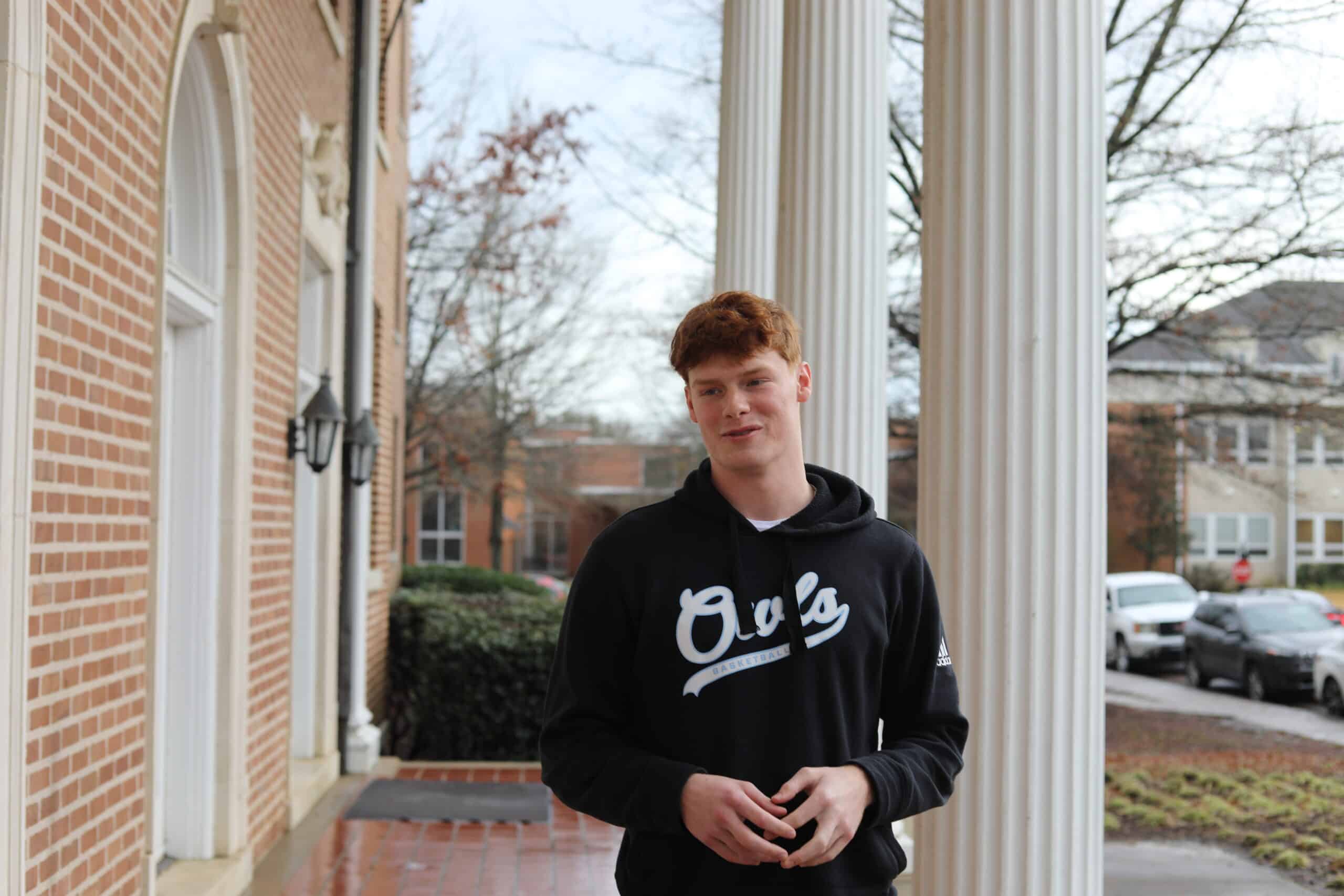
It’s unclear if it’s working yet. Josh Dukes, a sophomore shooting guard from Booneville whose high school basketball team won the state championship, was enticed by the opportunity to help build MUW’s program from the ground up.
But his family of five brothers (and one sister) jokes that Dukes is playing “women’s basketball.” The team has a losing record. The university’s name makes it easier for other players, Dukes said, to “get inside your head.”
Losing its home turf
There is an elephant-sized bulldog in the room.
When Miller attended MUW in the 1980s, it had a complementary relationship to Mississippi State. Male students would come to Columbus to drink and eat out, because Lowndes County was wet and Oktibbeha County was dry. Female students would go to Starkville for the games.
It’s more competitive now.
Today, MSU is roaring, enjoying record enrollments, major success in fundraising and a slew of new construction projects. It is also raking in an increasing share of the number of college students who hail from Lowndes County, making MUW the only regional college in Mississippi at risk of losing its home turf.
In 2022, 450 students went to MUW compared to 432 to MSU, according to IHL data.
MUW is like a tiny planet that may be fated to fall into MSU’s orbit.
“They’ve got more gravitational pull than we do being so close to them,” Brooking said.
IHL classifies MUW as a “regional college,” yet MUW’s leaders know that in many ways, they are outmatched by MSU and EMCC. MUW must own its backyard, Miller said, but it also needs a name that can attract students from across the state and the South, one that gets at the one thing the small campus has: A private-college feel on a state-dollar dime that is accessible to all.
“At Mississippi State or Ole Miss, you might be intimidated … by the people with connections,” Miller said. “Others might say, ‘I couldn’t compete against that.’ But here, we nurture people taking on responsibility and getting to be a leader.”
But is that message connecting with Mississippians?
In downtown Columbus, where the number of local businesses rival Oxford’s Square, Naiya Bell, a 21-year-old community college student who was looking for jobs with her friends, said she had considered MUW’s nursing program.
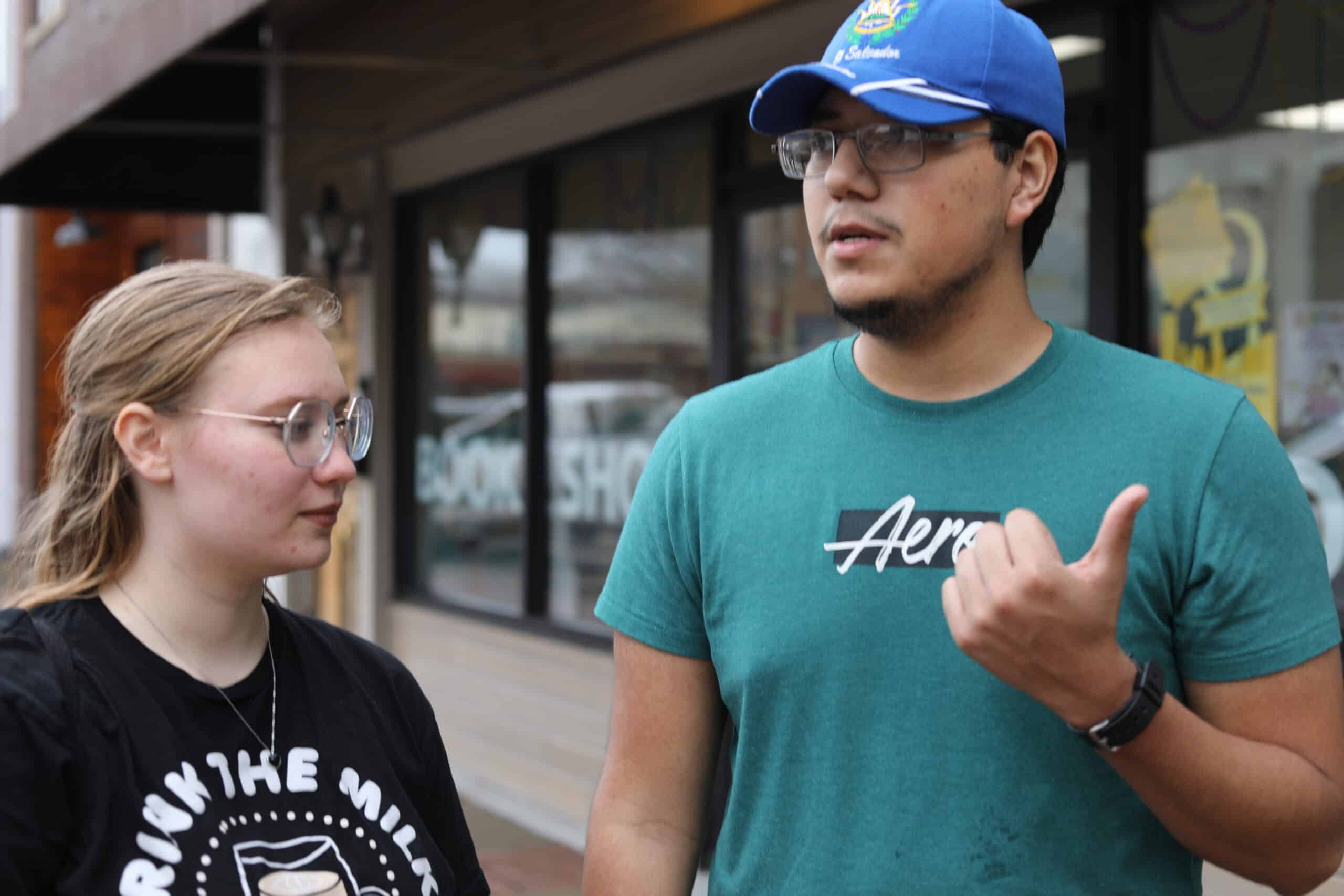
But Brenda Heard, a landlord dropping off dry-cleaning who lives in Alabama, leases to MUW students but didn’t know if the university admitted men. Roderick Dillard, a firefighter, said his daughters went to MSU for the experience.
“Kids like to get out,” Dillard said.
Naomi Simpson and Angel Viveros students from the academically rigorous Mississippi School for Math and Science, were walking into a local bookstore as they recalled their high school’s recent college fair, which was held in MUW’s gym. Simpson listed off the tables she recalled Mississippi State having: Agriculture, the honors college, education and more.
Then Simpson paused. For a moment, neither student could remember if MUW was there, too. It was, Viveros remembered.
Simpson shrugged. “Maybe I just didn’t go up to them.”
This article first appeared on Mississippi Today and is republished here under a Creative Commons license.![]()
Did you miss our previous article…
https://www.biloxinewsevents.com/?p=327817
Mississippi Today
Mississippi River flooding Vicksburg, expected to crest on Monday
Warren County Emergency Management Director John Elfer said Friday floodwaters from the Mississippi River, which have reached homes in and around Vicksburg, will likely persist until early May. Elfer estimated there areabout 15 to 20 roads underwater in the area.
“We’re about half a foot (on the river gauge) from a major flood,” he said. “But we don’t think it’s going to be like in 2011, so we can kind of manage this.”
The National Weather projects the river to crest at 49.5 feet on Monday, making it the highest peak at the Vicksburg gauge since 2020. Elfer said some residents in north Vicksburg — including at the Ford Subdivision as well as near Chickasaw Road and Hutson Street — are having to take boats to get home, adding that those who live on the unprotected side of the levee are generally prepared for flooding.



“There are a few (inundated homes), but we’ve mitigated a lot of them,” he said. “Some of the structures have been torn down or raised. There are a few people that still live on the wet side of the levee, but they kind of know what to expect. So we’re not too concerned with that.”
The river first reached flood stage in the city — 43 feet — on April 14. State officials closed Highway 465, which connects the Eagle Lake community just north of Vicksburg to Highway 61, last Friday.

Elfer said the areas impacted are mostly residential and he didn’t believe any businesses have been affected, emphasizing that downtown Vicksburg is still safe for visitors. He said Warren County has worked with the U.S. Army Corps of Engineers and the Mississippi Emergency Management Agency to secure pumps and barriers.
“Everybody thus far has been very cooperative,” he said. “We continue to tell people stay out of the flood areas, don’t drive around barricades and don’t drive around road close signs. Not only is it illegal, it’s dangerous.”
NWS projects the river to stay at flood stage in Vicksburg until May 6. The river reached its record crest of 57.1 feet in 2011.




This article first appeared on Mississippi Today and is republished here under a Creative Commons Attribution-NoDerivatives 4.0 International License.![]()
Mississippi Today
With domestic violence law, victims ‘will be a number with a purpose,’ mother says
Joslin Napier. Carlos Collins. Bailey Mae Reed.
They are among Mississippi domestic violence homicide victims whose family members carried their photos as the governor signed a bill that will establish a board to study such deaths and how to prevent them.
Tara Gandy, who lost her daughter Napier in Waynesboro in 2022, said it’s a moment she plans to tell her 5-year-old grandson about when he is old enough. Napier’s presence, in spirit, at the bill signing can be another way for her grandson to feel proud of his mother.
“(The board) will allow for my daughter and those who have already lost their lives to domestic violence … to no longer be just a number,” Gandy said. “They will be a number with a purpose.”
Family members at the April 15 private bill signing included Ashla Hudson, whose son Collins, died last year in Jackson. Grandparents Mary and Charles Reed and brother Colby Kernell attended the event in honor of Bailey Mae Reed, who died in Oxford in 2023.
Joining them were staff and board members from the Mississippi Coalition Against Domestic Violence, the statewide group that supports shelters and advocated for the passage of Senate Bill 2886 to form a Domestic Violence Facility Review Board.
The law will go into effect July 1, and the coalition hopes to partner with elected officials who will make recommendations for members to serve on the board. The coalition wants to see appointees who have frontline experience with domestic violence survivors, said Luis Montgomery, public policy specialist for the coalition.
A spokesperson from Gov. Tate Reeves’ office did not respond to a request for comment Friday.
Establishment of the board would make Mississippi the 45th state to review domestic violence fatalities.
Montgomery has worked on passing a review board bill since December 2023. After an unsuccessful effort in 2024, the coalition worked to build support and educate people about the need for such a board.
In the recent legislative session, there were House and Senate versions of the bill that unanimously passed their respective chambers. Authors of the bills are from both political parties.
The review board is tasked with reviewing a variety of documents to learn about the lead up and circumstances in which people died in domestic violence-related fatalities, near fatalities and suicides – records that can include police records, court documents, medical records and more.
From each review, trends will emerge and that information can be used for the board to make recommendations to lawmakers about how to prevent domestic violence deaths.
“This is coming at a really great time because we can really get proactive,” Montgomery said.
Without a board and data collection, advocates say it is difficult to know how many people have died or been injured in domestic-violence related incidents.
A Mississippi Today analysis found at least 300 people, including victims, abusers and collateral victims, died from domestic violence between 2020 and 2024. That analysis came from reviewing local news stories, the Gun Violence Archive, the National Gun Violence Memorial, law enforcement reports and court documents.
Some recent cases the board could review are the deaths of Collins, Napier and Reed.
In court records, prosecutors wrote that Napier, 24, faced increased violence after ending a relationship with Chance Fabian Jones. She took action, including purchasing a firearm and filing for a protective order against Jones.
Jones’s trial is set for May 12 in Wayne County. His indictment for capital murder came on the first anniversary of her death, according to court records.
Collins, 25, worked as a nurse and was from Yazoo City. His ex-boyfriend Marcus Johnson has been indicted for capital murder and shooting into Collins’ apartment. Family members say Collins had filed several restraining orders against Johnson.
Johnson was denied bond and remains in jail. His trial is scheduled for July 28 in Hinds County.
He was a Jackson police officer for eight months in 2013. Johnson was separated from the department pending disciplinary action leading up to immediate termination, but he resigned before he was fired, Jackson police confirmed to local media.
Reed, 21, was born and raised in Michigan and moved to Water Valley to live with her grandparents and help care for her cousin, according to her obituary.
Kylan Jacques Phillips was charged with first degree murder for beating Reed, according to court records. In February, the court ordered him to undergo a mental evaluation to determine if he is competent to stand trial, according to court documents.
At the bill signing, Gandy said it was bittersweet and an honor to meet the families of other domestic violence homicide victims.
“We were there knowing we are not alone, we can travel this road together and hopefully find ways to prevent and bring more awareness about domestic violence,” she said.
This article first appeared on Mississippi Today and is republished here under a Creative Commons Attribution-NoDerivatives 4.0 International License.
Mississippi Today
Court to rule on DeSoto County Senate districts with special elections looming
A federal three-judge panel will rule in coming days on how political power in northwest Mississippi will be allocated in the state Senate and whether any incumbents in the DeSoto County area might have to campaign against each other in November special elections.
The panel, comprised of all George W. Bush-appointed judges, ordered state officials last week to, again, craft a new Senate map for the area in the suburbs of Memphis. The panel has held that none of the state’s prior maps gave Black voters a realistic chance to elect candidates of their choice.
The latest map proposed by the all-Republican State Board of Election Commissioners tweaked only four Senate districts in northwest Mississippi and does not pit any incumbent senators against each other.
The state’s proposal would keep the Senate districts currently held by Sen. Michael McLendon, a Republican from Hernando and Sen. Kevin Blackwell, a Republican from Southaven, in majority-white districts.
But it makes Sen. David Parker’s district a slightly majority-Black district. Parker, a white Republican from Olive Branch, would run in a district with a 50.1% black voting-age population, according to court documents.
The proposal also maintains the district held by Sen. Reginald Jackson, a Democrat from Marks, as a majority-Black district, although it reduces the Black voting age population from 61% to 53%.
Gov. Tate Reeves, Secretary of State Michael Watson, and Attorney General Lynn Fitch comprise the State Board of Election Commissioners. Reeves and Watson voted to approve the plan. But Watson, according to meeting documents, expressed a wish that the state had more time to consider different proposals.
Fitch did not attend the meeting, but Deputy Attorney General Whitney Lipscomb attended in her place. Lipscomb voted against the map, although it is unclear why. Fitch’s office declined to comment on why she voted against the map because it involves pending litigation.
The reason for redrawing the districts is that the state chapter of the NAACP and Black voters in the state sued Mississippi officials for drawing legislative districts in a way that dilutes Black voting power.
The plaintiffs, represented by the ACLU, are likely to object to the state’s newest proposal, and they have until April 29 to file an objection with the court
The plaintiffs have put forward two alternative proposals for the area in the event the judges rule against the state’s plans.
The first option would place McLendon and Blackwell in the same district, and the other would place McLendon and Jackson in the same district.
It is unclear when the panel of judges will issue a ruling on the state’s plan, but they will not issue a ruling until the plaintiffs file their remaining court documents next week.
While the November election is roughly six months away, changing legislative districts across counties and precincts is technical work, and local election officials need time to prepare for the races.
The judges have not yet ruled on the full elections calendar, but U.S. Fifth Circuit Court of Appeals Judge Leslie Southwick said at a hearing earlier this month that the panel was committed have the elections in November.
This article first appeared on Mississippi Today and is republished here under a Creative Commons Attribution-NoDerivatives 4.0 International License.
-

 News from the South - Florida News Feed6 days ago
News from the South - Florida News Feed6 days agoJim talks with Rep. Robert Andrade about his investigation into the Hope Florida Foundation
-

 News from the South - Virginia News Feed7 days ago
News from the South - Virginia News Feed7 days agoHighs in the upper 80s Saturday, backdoor cold front will cool us down a bit on Easter Sunday
-

 News from the South - Arkansas News Feed7 days ago
News from the South - Arkansas News Feed7 days agoValerie Storm Tracker
-

 News from the South - Kentucky News Feed7 days ago
News from the South - Kentucky News Feed7 days agoU.S. Supreme Court pauses deportations under wartime law
-

 News from the South - Alabama News Feed4 days ago
News from the South - Alabama News Feed4 days agoPrayer Vigil Held for Ronald Dumas Jr., Family Continues to Pray for His Return | April 21, 2025 | N
-

 Mississippi Today5 days ago
Mississippi Today5 days ago‘Trainwreck on the horizon’: The costly pains of Mississippi’s small water and sewer systems
-

 News from the South - Texas News Feed5 days ago
News from the South - Texas News Feed5 days agoMeteorologist Chita Craft is tracking a Severe Thunderstorm Warning that's in effect now
-

 Mississippi Today7 days ago
Mississippi Today7 days agoOn this day in 1977, Alex Haley awarded Pulitzer for ‘Roots’














































